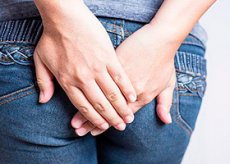Medical expert of the article
New publications
Anus muscle syndrome.
Last reviewed: 07.07.2025

All iLive content is medically reviewed or fact checked to ensure as much factual accuracy as possible.
We have strict sourcing guidelines and only link to reputable media sites, academic research institutions and, whenever possible, medically peer reviewed studies. Note that the numbers in parentheses ([1], [2], etc.) are clickable links to these studies.
If you feel that any of our content is inaccurate, out-of-date, or otherwise questionable, please select it and press Ctrl + Enter.

Levator ani syndrome is episodic pain in the rectum caused by spasm of the levator ani muscle.
Proctalgia fugax (pain in the rectum that passes quickly) and coccydynia (pain in the coccygeal region) are variants of levator ani syndrome. Spasm of the rectum causes pain, usually unrelated to defecation, lasting less than 20 minutes. The pain may be short-lived and intense, or vague high in the rectum. Anal pain may occur spontaneously or be associated with sitting, and may also occur during sleep. The pain may cause a sensation of obstructed gas or stool passage. In severe cases, the pain persists for many hours and often recurs. Because of these symptoms, patients sometimes undergo various rectal surgeries, but without sufficient effectiveness.
Diagnosis of levator ani syndrome
Physical examination helps to exclude other pathological changes in the rectum that cause pain (e.g., hemorrhoids, fissures, abscesses). Most often, physical examination does not reveal pathological changes, although, usually on the left, tenderness and hardening of the levator ani muscle may be detected. In rare cases, the cause of pain may be diseases of the pelvic organs or prostate gland.
 [ 1 ]
[ 1 ]
Treatment of levator ani syndrome
Treatment of levator ani syndrome involves explaining the nature of the disorder to the patient. Acute episodes of pain may be relieved by passing gas or stool, sitz baths, and non-narcotic analgesics. In cases of more severe symptoms, physiotherapy with electrogalvanic stimulation of the lower rectum is effective. Muscle relaxants or anal sphincter massage under local or regional anesthesia may be used, but the effectiveness of such treatments is not fully understood.

